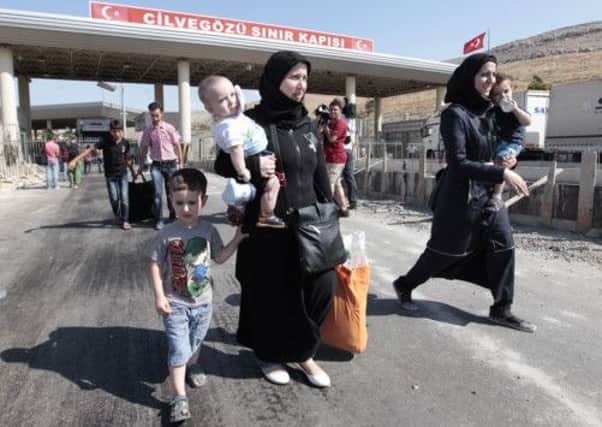William Hague: Danger and opportunity ahead in Middle East


Whatever the pressure of other issues, we must never lose sight of the importance and centrality of the Middle East peace process to the lives of millions of Israelis and Palestinians and to international peace and security.
I pay tribute to the leadership of Secretary John Kerry, Prime Minister Netanyahu and President Abbas for the progress that has been made, including the resumption of negotiations in July.
Advertisement
Hide AdAdvertisement
Hide AdWe have reiterated the United Kingdom’s unequivocal support for a two-state solution based on 1967 borders with agreed land swaps, Jerusalem as the shared capital, and a just and agreed settlement for refugees.
The situation in Syria remains catastrophic. More than 100,000 people have been killed, and the number of Syrian refugees has grown by more than 1.8 million in just 12 months, to over two million.
We must always be clear that we will not have succeeded in our work until this violence has been brought to a stop, but nevertheless we were able to make some diplomatic progress in New York on our objectives – to prevent the further use of chemical weapons, to alleviate humanitarian suffering, and to promote a political settlement to the conflict.
The voluntary destruction of a deadly arsenal of weapons that until recently the Assad regime denied it possessed is an important step forward, and a vindication of the threat of military action by the United States of America.
Advertisement
Hide AdAdvertisement
Hide AdSecondly, hundreds of thousands of Syrian civilians continue to suffer atrociously from the regime’s use of conventional weapons. The UK is leading the way in alleviating desperate humanitarian suffering. Nick Clegg has confirmed an additional £100m in UK assistance, bringing our total humanitarian contribution to date to £500m, the largest ever British response to a single crisis.
The Prime Minister’s campaign, begun at the G20 and followed up by our embassies worldwide, has helped to secure more than $1bn in new international pledges of humanitarian assistance since the start of September, and we look to other countries to do more to meet the level of suffering and instability caused by such an unprecedented number of people being in need.
There can be no peaceful and political settlement in Syria without the participation of the moderate opposition. That is why we are providing more than £20m in non-lethal support to the moderate opposition and will do more in the coming months.
We have also agreed to resume negotiations on Iran’s nuclear programme in Geneva next week. We are looking forward to seeing serious proposals from Iran to follow up on its stated desire to make rapid progress with negotiations. It will be very important for Iran’s relations with the international community for the marked change of presentation and statements to be accompanied by concrete actions and a viable approach to negotiations.
Advertisement
Hide AdAdvertisement
Hide AdWe must not forget for one moment that, as things stand today, Iran remains in defiance of six UN Security Council resolutions and multiple resolutions of the International Atomic Energy Agency’s board of governors and that it is installing more centrifuges in its nuclear facilities. In the absence of change in those policies, we will continue to maintain strong sanctions.
However, we must test the Iranian government’s sincerity to the full, and it is important that our channels of communication are open for that. Our diplomatic relations suffered a severe setback when our embassy compounds in Tehran were overrun in 2011 and the Vienna conventions flouted.
It is understood on both sides that, given this history, progress in our bilateral relationship needs to proceed on a step-by-step and reciprocal basis.
We must not underestimate the difficulties ahead. Iran has a complex power structure; there are voices in Iran who do not agree with their government’s stated desire to see progress on nuclear negotiations and a rapprochement with the West, and improvements in our bilateral relations will require confidence on both sides.
Advertisement
Hide AdAdvertisement
Hide AdBut to be open to such improvements is consistent with our desire to find a peaceful resolution to the nuclear dispute and the fact that we have no quarrel with the people of Iran.
I am conscious of the fact that on all these issues the coming months may be unusually significant and replete with dangers but also with opportunities. The Government will spare no effort to promote a peaceful resolution to each of these conflicts and crises, working closely with our allies at all times and taking full advantage of every diplomatic opening; never starry-eyed but always pursuing progress through resolute diplomacy.
*William Hague is the Richmond MP and Foreign Secretary. This is an edited version of his speech to the House of Commons on the Middle East peace process.